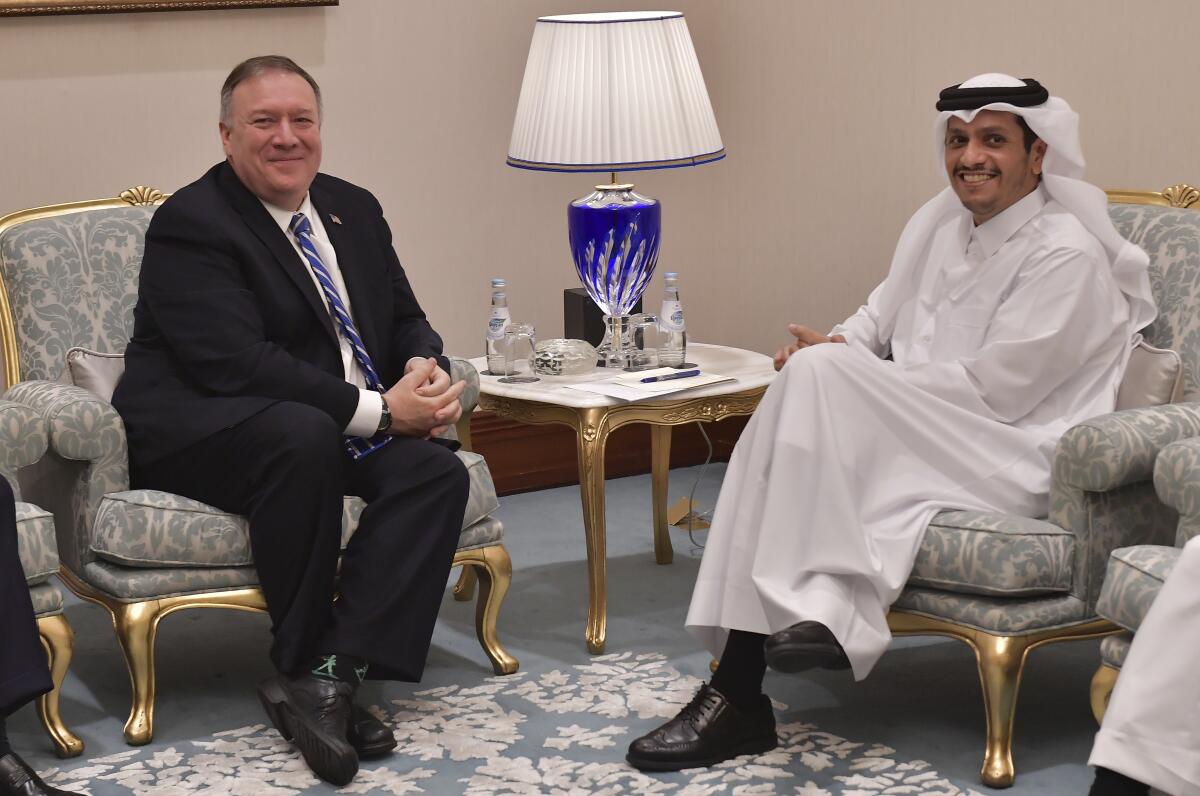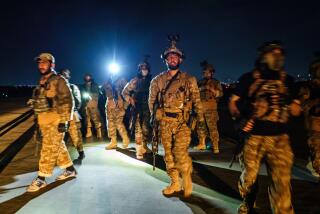U.S. strikes Taliban a day after Trump hails their Afghan accord

- Share via
WASHINGTON — U.S. warplanes carried out an airstrike against Taliban fighters in southern Afghanistan on Wednesday, just days after the two sides signed a tentative peace agreement that now seems at risk.
The U.S. planes targeted militants in Helmand province who were assaulting a checkpoint held by the Afghan army, according to Col. Sonny Leggett, a military spokesman in Kabul. He called it a “defensive strike” to aid an ally, the Afghan government.
“We are committed to peace. However we have the responsibility to defend our... partners” Leggett said in a tweet. Taliban fighters “appear intent on squandering this [opportunity] and ignoring the will of the people for peace.”
The incident underscored the fragility of the U.S.-Taliban agreement. Heralded by President Trump, who is determined to end the war in an election year, the accord calls for the withdrawal of American troops from Afghanistan within 14 months and for the Taliban and the Afghan government, which was not a party to the accord, to hold talks this month on a cease-fire and a final settlement of the nearly 2-decade-old conflict.
That blueprint appears threatened by the resurgence in violence and other festering disputes. Chief among them is whether Afghan President Ashraf Ghani will release as many as 5,000 Taliban prisoners before the talks begin, a Taliban demand that Ghani has so far rebuffed.
The U.S.-Taliban accord calls on both sides and the Afghan government to avoid conflict, continuing a pause in violence that began as a confidence-building step a week before the agreement was signed in Doha, Qatar, on Saturday.
But Taliban leaders appear to have decided that Trump is so eager to bring the 12,000 American forces home that he will not pull out of the deal as long as the militant group confines its attacks to Afghan government forces.
On Monday the group’s leaders ordered their fighters in a letter to resume attacks on the government forces, but not to attack U.S. and other foreign troops. Taliban fighters carried out 43 attacks on the Afghan army on Tuesday alone, Leggett said. The airstrike Wednesday was the first U.S. attack in 11 days, he added.
In Kabul, Gen. Austin “Scotty” Miller, the top U.S. commander, had told reporters Tuesday that the planned peace process “is fragile if the Taliban are not going to lower violence.” Otherwise, he added, “it’s hard to have an agreement.”
Trump has not specified the conditions under which he might slow or halt the planned withdrawal. The U.S. is planning to begin pulling out troops soon, taking its force level down to 8,600 by early summer. All remaining U.S. forces, along with 8,000 foreign troops and tens of thousands of contractors, are supposed to be out of the country by May 2021.
Suhail Shaheen, a Taliban spokesman, said Tuesday that the militant group was committed to the agreement but called on the U.S. and the Afghan government to observe it as well.
“The Islamic Emirate, according to the plan, will implement all parts of the agreement one after another to prevent the intensity of war,” he said in a tweet Tuesday. “The other side must also remove the barriers to the implementation of all parts of the agreement.”
The attacks came just a day after Trump spoke with a top Taliban leader by phone about ending the war in Afghanistan. It was the first known direct contact between an American president and the militant movement in the 19 years since U.S. troops entered the country after the terrorist attacks of Sept. 11, 2001.
Trump confirmed that he spoke with Taliban political leader Mullah Abdul Ghani Baradar only after the group first announced the call. The Taliban sheltered Osama bin Laden before the terrorist attacks, and have killed more than 2,400 U.S. soldiers since the war started nearly two decades ago.
“They’re looking to get this ended, and we’re looking to get it ended,” the president said after telling reporters, “We had a very good conversation with the leader of the Taliban today.”
He implied there may have been previous contacts. When asked whether it was the first time he had spoken with the Taliban, Trump said, “I don’t want to say that.” The contact was another sign of rehabilitation for a group that imposed a harsh version of Islamic law in Afghanistan before its 2001 ouster by the U.S. and its NATO allies. The Taliban subsequently was treated as an international pariah until it became clear the group could not be defeated militarily.
Trump said he planned to meet with Taliban leaders soon, but provided no details. He also appeared to give the militant group a green light to undertake attacks against unspecified terrorists: “We’ll be very much hoping that they will be doing what they say they’re going to be doing: They will be killing terrorists. They will be killing some very bad people. They will keep that fight going.”
In September, Trump planned to invite Baradar and other Taliban leaders to Camp David to finalize a peace deal, but he called off the meeting after a U.S. soldier was killed in Afghanistan. To reporters Tuesday, he appeared to suggest that the U.S.-backed Afghan government was the obstacle to finalizing a peace agreement.
“We’ll have to see about the country itself, but the country has got to get it ended,” he said.
Ghani’s government, excluded from the talks between U.S. and Taliban negotiators, now is deeply nervous that the Trump administration is intent on forcing it to share power with the hated Taliban, which has caused tens of thousands of Afghan casualties.
Trump did not mention Ghani, but he suggested he got along well with Baradar. “The relationship is very good that I have with the mullah,” he said.
As president, Trump frequently has spoken of U.S. relations with other nations in terms of his personal rapport with their leaders, and his comment was reminiscent of previous statements of warm feelings for American adversaries. He has said, for example, that he and North Korean leader Kim Jong Un “fell in love.”
Trump has repeatedly promised to bring troops home from overseas war zones and has long sought an international agreement with multiple adversaries, openly hoping it might secure him the Nobel Peace Prize to match the one awarded to former President Obama.
“Other presidents have tried and they have been unable to get any kind of an agreement,” the president said. Obama, however, insisted that any talks with the Taliban had to be led by the Afghan government, a policy that was abandoned by Trump — angering Ghani and his government.
According to the Taliban account of the call between Trump and Baradar, they spoke for more than half an hour and discussed women’s rights and the possible release of Taliban prisoners held by the U.S.-backed government in Kabul.
“I’m glad to talk to you,” Trump told Baradar, in the Taliban account. “You are strong people and you have a great country and I know you are fighting for your land.”
Baradar, who is known as a relative moderate in the militant group’s leadership, said the U.S. and the Taliban could have “positive bilateral relations in the future” if the U.S. abides by the agreement.
The White House, in a later statement, did not dispute the Taliban account.
More to Read
Sign up for Essential California
The most important California stories and recommendations in your inbox every morning.
You may occasionally receive promotional content from the Los Angeles Times.











